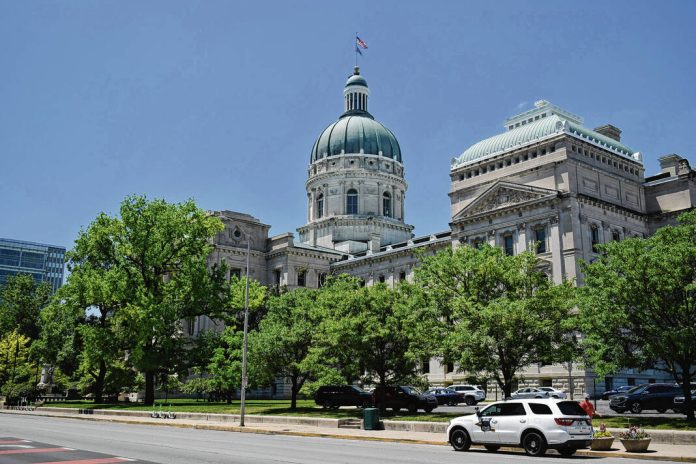House Republicans on Tuesday weakened their Senate counterparts’ latest attempt to limit the governor’s emergency powers following a slew of pandemic-era executive orders by Republican Gov. Eric Holcomb.
Rep. Matt Lehman, R-Berne, who sponsored Senate Bill 234, said it established “parameters” for the state’s next governor. Holcomb is term-limited, and a packed slate of candidates is competing to replace him.
“I think the time is right, with the new governor coming in, to know where the parameters are,” Lehman told the Public Health Committee. “If I’m going to be the governor, I’m going to ask my staff how far I can go in every division within the state. I think we need to set that parameter now.”
The Senate version of the legislation would’ve removed a Hoosier governor’s ability to extend a state of disaster emergency after 30 days. It included an exception: one 30-day renewal for the exclusive purpose of receiving federal relief funds. And it applied to all disaster declarations, not just statewide.
Lehman brought changes Tuesday allowing the governor to make statewide disaster emergency declarations lasting 30 days with one 30-day renewal. There is no tie to funding. The General Assembly would have to convene to continue any statewide declaration.
That would leave declarations applying to specific counties, rather than the whole state, operating under the status quo.
“We’ve had only one example in the state’s history where we had any sort of emergency go past 60 days. That was Covid, and that was statewide,” Lehman said. “That’s what my template is: if we’re going to involve the General Assembly, it needs to have a bigger impact than (on) one or two locations.”
New declarations would still have to be unrelated to previous ones, and lawmakers would still be able to end them at any time.
Sen. Chris Garten, R-Charlestown, defends a bill limiting governor-called states of emergency during session on Monday, Jan. 22, 2024. (Leslie Bonilla Muñiz/Indiana Capital Chronicle)
Despite the changes, bill author Sen. Chris Garten, R-Charlestown, said he was “supportive of the bill moving” and professed “trust” in the legislative process.
“I’m committed to working with House leadership on a bill that allows us the ability to represent Hoosier taxpayers in the time of a crisis and statewide emergency,” he said. “… The underlying bill that we sent would’ve ensured that. I think the amendment still does that as well. It’s a little different of a path.”
Kileen Lindgren, a legal policy manager with California-based Pacific Legal Foundation, testified that the Senate version of the bill protected residents and “each co-equal branch of government at crucial moments of decision-making.”
The time extensions in the amended version, she said, “really go against the heart of this bill.”
But in contrast to lengthy discussion in the Senate last month, with multiple Democrats speaking in opposition, the changes garnered bipartisan support in the House committee.
It passed on a 10-1 vote, with one Democrat, Rep. Robin Shackleford of Indianapolis, voting in opposition. Republican Rep. Matt Hostettler, of Patoka, indicated that he preferred the original version but wanted the legislation to advance.
Rep. Denny Zent, R-Angola, said he wanted the state to be prepared for disasters.
“I also believe that the world is getting smaller. And as it gets smaller, the chance of something happening magnifies,” he said. “… So we need to be ready.”
Reporter Casey Smith contributed reporting.
By Leslie Bonilla Muñiz –The Indiana Capital Chronicle is an independent, not-for-profit news organization that covers state government, policy and elections.





